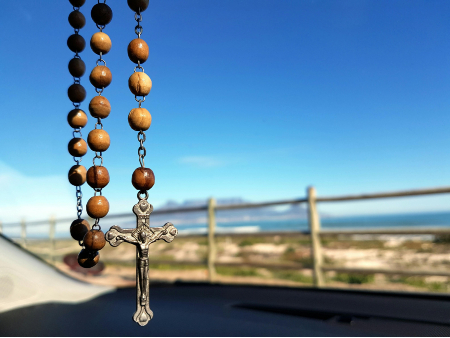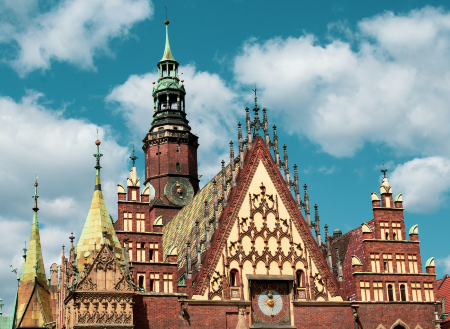We ask you, humbly: don't scroll away.
Hi readers, it seems you use Catholic Online a lot; that's great! It's a little awkward to ask, but we need your help. If you have already donated, we sincerely thank you. We're not salespeople, but we depend on donations averaging $14.76 and fewer than 1% of readers give. If you donate just $5.00, the price of your coffee, Catholic Online School could keep thriving. Thank you.Help Now >
Interview: Fr. Thomas Berg on Future of the Legion of Christ
FREE Catholic Classes
'I hope that the Legion will very quickly accelerate its disavowal of, and disassociation with, Fr. Maciel.'
We ask you, humbly: don't scroll away.
Hi readers, it seems you use Catholic Online a lot; that's great! It's a little awkward to ask, but we need your help. If you have already donated, we sincerely thank you. We're not salespeople, but we depend on donations averaging $14.76 and fewer than 1% of readers give. If you donate just $5.00, the price of your coffee, Catholic Online School could keep thriving. Thank you.Help Now >
Highlights
Chiesa (chiesa.espresso.repubblica.it)
7/14/2009 (1 decade ago)
Published in Europe
ROME (Chiesa) - We present the full interview of Fr. Thomas Berg conducted by Italian Journalist Sandro Magister for our readers throughout the world. The global visitation of the Legion of Christ begins on Wednesday July 15, 2009:
"An unprecedented question in the history of the Church"
Q: When you recently left the Legion, you expressed in a statement your sympathy for the congregation in which you were formed as a priest. What are your hopes now that the apostolic visitation to the Legion of Christ has been announced?
A: I, like the vast majority of persons in the Church, try to remain positive and hopeful for the Legion and Regnum Christi movement. We only want the best for our brothers and sisters in Christ. We understand that this might involve taking some tough medicine, but I believe it is possible for a majority of these wonderful men and women will rise to the occasion because they really do have a profound love for Christ in their hearts. I would like to insist again that I bear no hatred, anger or resentment toward the Legion. Much less, do I spend every waking hour thinking about the Legion. I am getting on with my life. Nonetheless, your initiative in posing these questions has afforded me the opportunity to say a number of things that in conscience I believe need to be said at this juncture.
Q: How do you predict the visitation will go?
A: It would really be foolish of me to even begin to speculate on this.
Q: What would be your suggestions to the five visitors?
A: I will limit myself to one overall suggestion: help the Legionaries to engage in an honest and objective self-critique. What I have found most unsettling of late is the kind of group-think that has settled in among the Legionaries: "We really don't think there is anything wrong with the internal culture of the Legion, but if the Holy See tells us to change things, we will." The docility to the Holy See, though laudable and correct, masks a huge internal flaw: the Legion's corporate inability to engage in a healthy self-critique. This is no time for a business as usual approach, but that has been the impression one generally gets from the Legionaries over the past five months of the crisis.
That inability to see and honestly recognize the flaws and errors that so many people outside the Legion are able to see speaks volumes. The Legionaries should be reminded that it is not the task of the Holy See to reform the Legion. The Legion will only be genuinely reformed when it reforms itself from within. But that can only begin with a self-examination that arises from within the Legion and owns up to the Legion's errors.
Q: And your suggestion to Regnum Christi members?
A: I am in no capacity to speak to them collectively. In February, a private email I intended to be shared broadly but to remain private was published all over the internet. But if any Regnum Christi member were to ask my personally, my advice would be along those same lines: focus on Christ, work carefully at discerning your own personal way ahead, be engaged in your parish, seek to grow in your interior life, strive to engage in a healthy and informed critique of the Legion and Regnum Christi.
Q: What do you think will happen with the Legion in the long run?
A: Again, it would be unwise for me to even begin to speculate at this point. That is up to the Holy Spirit who fortunately has multiple options open to him!
Q: How would you suggest dealing with the centrality given to the writings, the person and the figure of the founder, Marcial Maciel?
A: I hope that the Legion will very quickly accelerate its disavowal of, and disassociation with, Fr. Maciel. On that point, I see no other way forward. All - and I mean all - the pictures of Maciel yet hanging in Legionary houses have to go. They have to stop referring to his writings in public (I understand that at one recent Legionary community mass the homilist still saw fit to quote from one of Maciel's letters). A simple step in that direction, by the way, requires the immediate abrogation of their custom of referring to Fr. Maciel as "nuestro padre" or "mon pčre" - terms of endearment whose use he allowed and fostered. Amazingly, many if not most Legionaries still insist on using the term.
Q: What are the strengths you think the Legion and Regnum Christi can count on in this uncertain process?
A: If the Legion is true to its word, then the Church should be able to count on the docility of Legionaries and Regnum Christi members to embrace whatever is ultimately determined about them and their future. The Legion of Christ and Regnum Christi are composed of hundreds of good, holy men and women of God. I have the deepest esteem for so many of them. They, collectively, constitute a reason for optimism. But ultimately, our confidence has to rest in the power and working of the Holy Spirit, who, through the Holy See, will help all involved to arrive at a proper discernment of the most adequate solution for the Legion of Christ and the Regnum Christi movement.
 Hi readers, it seems you use Catholic Online a lot; that's great! It's a little awkward to ask, but we need your help. If you have already donated, we sincerely thank you. We're not salespeople, but we depend on donations averaging $14.76 and fewer than 1% of readers give. If you donate just $5.00, the price of your coffee, Catholic Online School could keep thriving. Thank you. Help Now >
Hi readers, it seems you use Catholic Online a lot; that's great! It's a little awkward to ask, but we need your help. If you have already donated, we sincerely thank you. We're not salespeople, but we depend on donations averaging $14.76 and fewer than 1% of readers give. If you donate just $5.00, the price of your coffee, Catholic Online School could keep thriving. Thank you. Help Now >
Q: What are the issues you think should change in the internal culture of the Legion, especially related to the recently suppressed "vow of charity", meaning the vow not to criticize one's superiors?
A: At the core of serious problems in the internal culture of the congregation is a mistaken understanding and living of the theological principle - in itself valid - that God's will is made manifest to the religious through his superior. The Legionary seminarian is erroneously led to foster a hyper-focusing on internal "dependence" on the superior for virtually every one of his intentional acts (either explicitly or in virtue of some norm or permission received, or presumed or habitual permissions). This is not in harmony with the tradition of religious life in the Church, nor is it theologically or psychologically sound. It entails rather an unhealthy suppression of personal freedom (which is a far cry from the reasoned, discerned and freely exercised oblation of mind and will that the Holy Spirit genuinely inspires in the institution of religious obedience) and occasions unholy and unhealthy restrictions on personal conscience.
Furthermore, Legionary norms regarding "reporting to," "informing," "communication with," and "dependence on" superiors constitute a system of control and conformity which now must be considered highly suspect given what we know about Fr. Maciel. They furthermore engender a simplistic, and humanly and theologically impoverished notion of God's will (its discernment and manifestation) that breeds personal immaturity.
More seriously, the lived manner in which Legionaries practice obedience is laced with the kind of unquestioning submission which allowed the cult of personality to emerge around the figure of Maciel in the first place and covered for his misdeeds. Legionary seminarians are essentially trained to suspend reason in their obedience and to seek a total internal conformity with all the norms, and to withstand any internal impulse to examine or critique the norms or the indications of superiors.
Granted, the primary motivation behind such living of obedience is the ideal of total "immolation" of oneself for the love of Christ as embodied in the relentless living of all norms and indications of the superiors. This "immolation" of intellect and will is at the heart of the "holocaust" that the Legionary is invited to live for love of Christ and the Church. While the motivation is valid, and generations of Legionaries have pursued this in good faith, in the long run it not only proves profoundly problematic, but also explains the negative personality change which many, if not most, Legionaries undergo over time: the shallowness of their emotional expression, the lack of empathy and inability to relate normally to others in so many contexts, the general sense of their being "out of touch," etc. Only exceptionally do Legionary priests move beyond this, but only thanks to the multiple talents and human gifts they brought with them to the Legion.
Q: What elements do you find more disturbing and in need of special attention from the visitors?
A: Just to name a couple. Why, for example, were approximately 25 Legionary priests convoked yet again - as groups are every year - to a two-month long "spiritual renewal" at the Legion's center for spirituality in Cotija, Michoacan Mexico, housed in the very house (now retreat center and museum) that Fr. Maciel grew up in? Why there? Why in Cotija? Why now?
Why, furthermore, has the Legion continued to engage in vocation work? Now? In these circumstances? It would be a very honest gesture for the Legion of Christ to simply call a halt to all vocational work at least for the duration of the canonical visitation, and even better until it finally gets its house in order.
And one of my deepest concerns is that current Legionary seminarians are not presently in a position to adequately discern what Christ is calling them to do. And this is because they are systematically deprived of the kind of information they not only have a right to know but a fundamental need to know: a complete presentation of the basic facts of Fr. Maciel's double life; the understanding that the religious life, with its norms and internal discipline, they have come to live is deeply problematic and in need of thorough scrutiny and review; a thorough presentation of the reasonable criticisms that have been leveled against the Legion and Regnum Christi; and an honest admission on the part of the major superiors of the Legion's errors. We should all find it deeply disturbing that most Legionary seminarians - and the same can be said of consecrated members of Regnum Christi - to this day live their daily lives largely unaware of most of these things, shielded as they are from virtually all negative information about the Legion and Regnum Christi. Consequently, they lack the requisite interior freedom to genuinely discern God's calling in their lives at present. This is something to which the visitors need to pay careful attention.
A much deeper issue, of course, is the question of the charism. I personally feel the need for the Church eventually - in some formal way - to reaffirm the validity of an institutional charism in the Legion of Christ and Regnum Christi. Regnum Christi members especially need to know from the highest Church authority whether there ever really was a genuine charism inspired by the Holy Spirit at work in the Legion and Regnum Christi, or whether what the Church has witnessed in the sixty-eight year phenomenon of the Legion was rather God simply drawing much good out of a primarily human and deeply flawed enterprise.
This question - whether there is a genuine institutional charism present here or not - is very serious and, as it presents itself in the case of the Legion, unprecedented in the history of the Church. I hope that the visitors will turn up useful information that will assist the Holy See in discerning the answer to that question.
Finally, I fear there may be more victims of Fr. Maciel out there. Their welfare has to become more clearly a palpable and obvious priority for the Legionary superiors. I am hopeful that the major superiors of the Legion who may be now have acquired much more information in this regard will be entirely forthcoming with the visitors.
Q: Do you think that the current leadership of the Legion is too closely associated to the founder to continue directing the Congregation?
A: That's a valid question. The Holy See might weigh in on it, but ultimately it seems the proper answer to that question would have to arise from a general chapter of the congregation which, in my opinion, should be conducted under the close supervision of the Holy See and suspending the current dispositions for a general chapter as outlined in the current constitutions of the Legion in a manner that would allow broader participation by a diversity of members, especially those who are not or have not been in leadership positions.
Q: Can a congregation such as the Legion survive without the "model" provided by a founder?
A: God can do all things. The Holy Spirit could surely raise up a group of Legionaries - cofounders who have disassociated themselves interiorly from Fr. Maciel - who, under the Spirit's inspiration, could provide model lives for future members and direct a new generation of Legionaries to draw from the rich treasure trove of religious spirituality which is the Church's patrimony. This could also be transmitted to the Regnum Christi movement.
---
Chiesa is a wonderful source on all things Catholic in Europe. It is skillfully edited by Sandro Magister. SANDRO MAGISTER was born on the feast of the Guardian Angels in 1943, in the town of Busto Arsizio in the archdiocese of Milan. The following day he was baptized into the Catholic Church. His wife�s name is Anna, and he has two daughters, Sara and Marta. He lives in Rome.










 Daily Readings for Wednesday, April 17, 2024
Daily Readings for Wednesday, April 17, 2024 St. Anicetus: Saint of the Day for Wednesday, April 17, 2024
St. Anicetus: Saint of the Day for Wednesday, April 17, 2024 Prayer to Love God above all Things: Prayer of the Day for Wednesday, April 17, 2024
Prayer to Love God above all Things: Prayer of the Day for Wednesday, April 17, 2024
